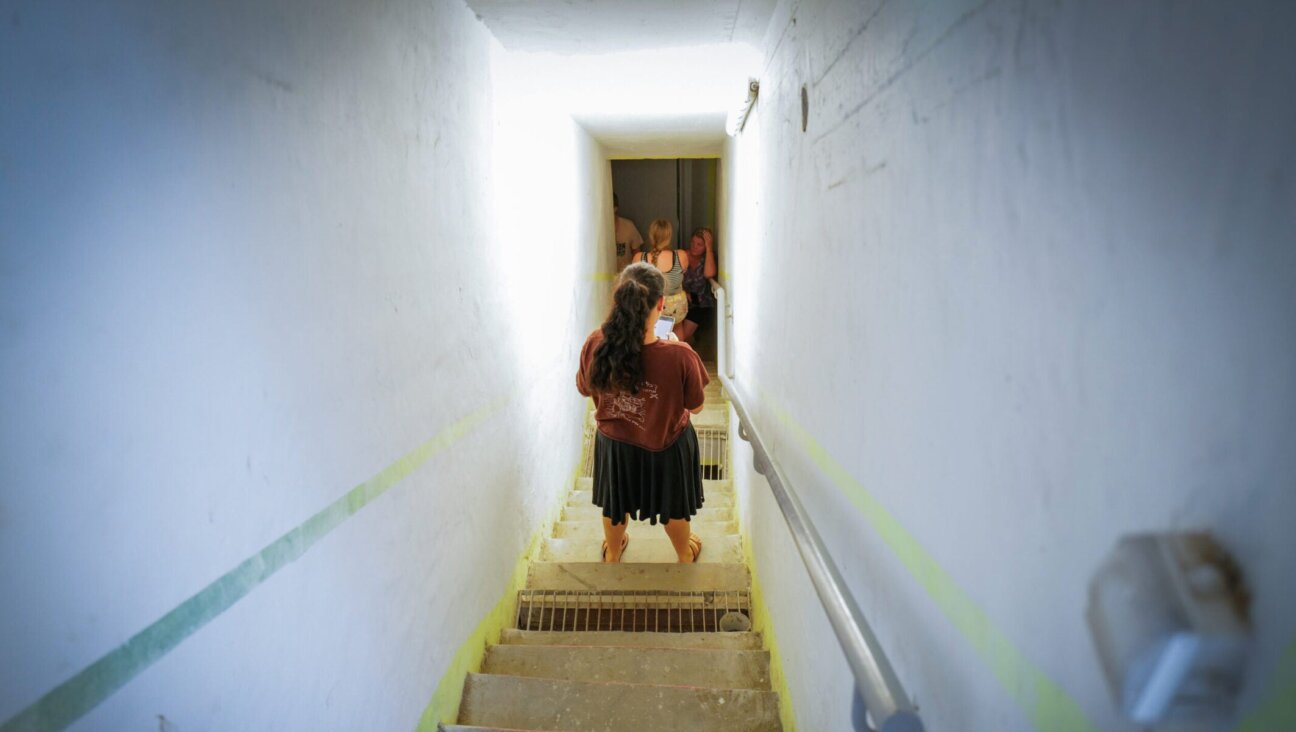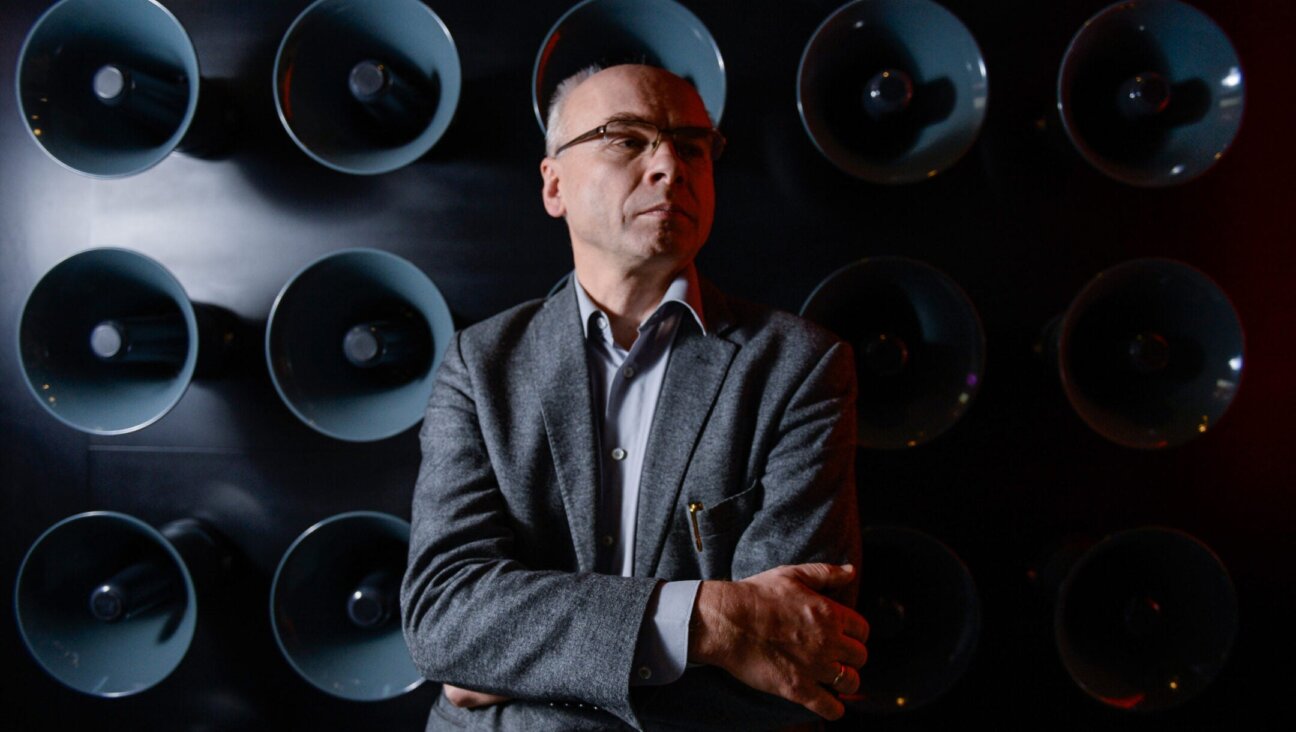On Net, Virtual Mayors Stake Claim to Famed Jewish Spots

Graphic by Angelie Zaslavsky
Ukrainian Jewish immigrants founded Zabar’s more than 70 years ago on Manhattan’s Upper West Side, but these days, an MTV producer named Kristen Smith rules over the beloved food emporium. Smith is the virtual mayor of Zabar’s, a title she wears proudly on foursquare, the social networking site.
Smith stops by Zabar’s nearly every day, and when she does, she “checks in” on her smartphone, letting her friends know her whereabouts. That’s what has earned her the mayor’s mantle, though it comes with no other perks of office. And when others hear about her title?

Checking In: Mordechai Lightstone, the mayor of 770 Eastern Parkway, Chabad headquarters in Brooklyn. Image by Mischka Lightstone
“People are actually impressed,” she said.
And not without reason: At last count, 2,089 people besides Smith had checked in to Zabar’s on foursquare. The networking website, founded only two years ago, claims more than two million people use it to keep tabs on each other’s locations in the real world. Earlier in August, the White House announced that President Obama, too, was now checking in on foursquare.
Smith, 30, admits that being Zabar’s virtual mayor is a somewhat contrived designation. She herself was once a foursquare skeptic, but now she’s changed her tune. “If there’s anywhere that I would be proud of being the mayor, it would be there,” she said of Zabar’s.
To become mayor, users must check in when they enter a place more often than anyone else in the past 60 days. And lest anyone get any ideas about stacking the clicks, only one check-in per day is counted toward mayorship of a particular place.
But unlike elected mayors of cities and towns, there are no keys to the city to bestow, no ribbons to cut, no spades of earth to turn over. The most that virtual mayors and foursquare users get is an occasional break on a restaurant meal or a store discount.
Zabar’s, with its rounds of cheese, barrels of olives and halvah by the half pound, is widely known as a second pantry to Jewish food lovers in New York. Other Jewish sites on foursquare have virtual mayors who, unlike Smith, are members of the tribe. Take, for example, Temple Isaiah, a Reform synagogue in West Lost Angeles. Who better to be mayor than a spiritual leader of the synagogue? Joel Nickerson, 32, is the assistant rabbi and, yes, rules the virtual roost at Temple Isaiah.
“It’s a new rabbinic world out there,” Nickerson said jokingly, noting that he’s on Twitter and Facebook, too. Nickerson said he believes that Jewish professionals need to keep up with the latest trends. He sees foursquare as a way of being a more accessible rabbi.
“It’s just another way of letting people know that I don’t just sit in an office; they can find me all over the place,” he said. “And I want them to find me.”
The ability to be so easily found — or, as some see it, tracked — is why some people want nothing to do with foursquare. But enthusiasts are quick to point out that they can easily make their check-ins private. Others stay off the public radar screen from time to time.
“I don’t always share every time I check in somewhere,” said Evan Blumenthal, 32, an Orthodox Jew and foursquare devotee.
Blumenthal lives primarily in Cedarhurst, N.Y., but thanks to a travel-intensive schedule for work, he counts himself as the virtual mayor of five synagogues in various states and countries. Once the mayor of his own local synagogue, he was ousted by a fellow congregant and doesn’t see himself catching up.
“I’m just way too far behind,” he said.
The element of competition, however, can be a big motivator.
The mayor of the Jewish Community Center in Manhattan, Sara Newman, 36, lost her title recently. And she wanted it back. Newman, her husband and their two children spend a lot of time at the JCC, using everything from its gym to day camps for kids.
“If I’m there so much, how can someone beat me?” she thought to herself when she was dethroned. Getting it back, she said, “was just a total personal game against myself.” That, she said, and a desire to get back her title.
Arguably the e-mayorest of them all is Mordechai Lightstone, 26, director of social media for Lubavitch.com. An early adopter of foursquare, he claims 92 mayorships to his name, the majority of which have a connection to Judaism. Lightstone goes to synagogue three times a day and checks in each time — except, of course, when the use of a smartphone would violate Halacha.
“Obviously, as an Orthodox organization we don’t want to encourage people to check in to their Chabad House on Shabbat,” he said.
Although Lightstone uses foursquare for both personal and professional uses, some of his provinces straddle both categories, including Brooklyn’s Crown Heights neighborhood and 770 Eastern Parkway, world headquarters of the Chabad-Lubavitch movement.
Those two sites in particular, he said, “give me a little bit of street cred within the Jewish foursquare community.”
Contact Gianna Palmer at [email protected]
















